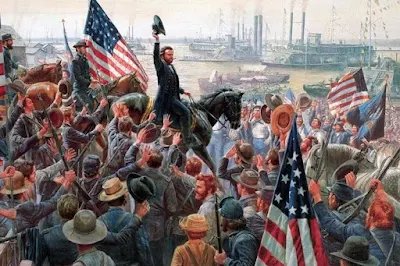The American Civil War (April 12, 1861 – May 26, 1865) was a bloody conflict between the northern United States and the southern states that seceded to form the Confederate States of America. The war was fought largely over the issue of slavery, with the North seeking to preserve the Union and abolish slavery, and the South seeking to maintain its independence and way of life based on slave labor.
The war resulted in the deaths of over 620,000 soldiers and had a profound impact on American society. It ended slavery in the United States, but the legacy of the war continues to be debated today.
The American Civil War: A Deeper Look
The American Civil War (April 12, 1861 – May 26, 1865) was a brutal conflict that tore the United States apart. Here's a breakdown of the key points:
Dates: The war officially began on April 12, 1861, with the Confederate bombardment of Fort Sumter in South Carolina. After four long and bloody years, the Confederacy surrendered on April 9, 1865.
Causes:
Slavery: This was the central issue. The North favored ending slavery, while the South's economy and society relied heavily on slave labor. Decades of rising tensions over slavery's expansion into new territories finally reached a breaking point.
States' Rights: Southern states believed in strong state governments with significant autonomy. They feared the federal government would restrict slavery and their way of life.
Additional factors:
Economic Disparity: The North's industrial economy boomed, while the South's agricultural system, dependent on slave labor, stagnated. This created economic friction.
The Missouri Compromise and Compromise of 1850: These were attempts to maintain a balance between slave and free states, but ultimately failed to quell tensions.
The Dred Scott Decision (1857): This Supreme Court ruling inflamed Northern abolitionists by denying citizenship to enslaved people and favoring the expansion of slavery.
John Brown's Raid (1859):This failed attempt by an abolitionist to incite a slave revolt further heightened fears and distrust.
Election of Abraham Lincoln (1860): The election of a Republican president opposed to slavery's expansion was the final straw for many Southern states, leading them to secede.
Impacts:
> End of Slavery: The war's most significant outcome was the abolition of slavery in the United States. The 13th Amendment (1865) officially banned it.
> Preserved Union: The Confederacy's dream of independence was crushed. The United States emerged as a single nation.
> Devastation and Reconstruction: The South was devastated by war. Reconstruction, the challenging period of rebuilding the nation, brought social, political, and economic changes, with ongoing struggles for African Americans to gain full civil rights.
> Shifting Political Landscape: The federal government's power was greatly strengthened by the war. It also led to the rise of the Republican Party as a dominant force.
> Lingering Racial Tensions: The war did not end racial prejudice and discrimination in the United States. The struggle for racial equality continued for many decades after.
Key Figures and Their Roles:
Union:
Abraham Lincoln (President): Provided unifying leadership throughout the war. Issued the Emancipation Proclamation, freeing slaves in Confederate states, and steered the nation towards ending slavery. His legacy is tied to preserving the Union and abolishing slavery.
Ulysses S. Grant (General): The Union's overall military strategist. Known for his tenacity and willingness to fight aggressively. His leadership is credited with the eventual Union victory. His legacy is one of military brilliance and perseverance.
William Sherman (General): Led successful campaigns in the South, using scorched-earth tactics. Though controversial, his victories weakened the Confederacy. His legacy is mixed, with some praising his effectiveness and others criticizing his brutality.
Harriet Tubman (Conductor on the Underground Railroad, Union Spy): Helped enslaved people escape to freedom through the Underground Railroad. Later served as a scout, spy, and abolitionist for the Union Army. Her legacy is one of courage, determination, and fighting for freedom.
Confederacy:
Jefferson Davis (President): Led the Confederacy, struggling to maintain unity and resources. Symbolized the fight for Southern independence. His legacy is tied to the Confederacy and its ideals, though some view him as an ineffective leader.
Robert E. Lee (General): The Confederacy's most skilled military leader. Lee's victories made him a Southern hero, but his ultimate surrender marked the Confederacy's defeat. His legacy is of a brilliant strategist, though some debate his decision to fight for a cause built on slavery.
Stonewall Jackson (General): Known for his aggressive tactics and leadership. His death at the Battle of Chancellorsville was a major blow to the Confederacy. His legacy is one of bravery and fighting spirit, but also of the brutal costs of war.
Legacies of the War:
End of Slavery: The most significant legacy is the abolition of slavery, though the fight for racial equality continued for many years.
Preserved Union: The United States remained a single nation, but the scars of sectional conflict lasted for generations.
Strengthened Federal Government: The federal government's power grew significantly, impacting state's rights debates.
Reconstruction: The South's reconstruction was long and difficult, with ongoing struggles for African American rights.
Racial Tensions: The war did not end racism. Jim Crow laws and segregation plagued the South for nearly a century.
National Identity: The Civil War solidified the idea of the United States as a single nation, though debates about its meaning and ideals would continue.
The American Civil War remains a pivotal moment in U.S. history, shaping the nation's social, political, and economic landscape.





